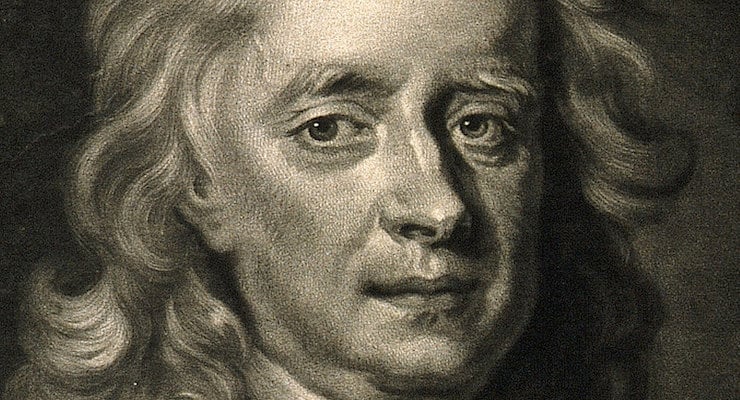
Was Isaac Newton’s research into magick, alchemy and the occult more meaningful than his discovery of gravity?
Isaac Newton, inventor of calculus and namesake of Classical (or “Newtonian”) physics, was also a known biblical scholar and believed there was secret knowledge encrypted in the Bible. In today’s polarized climate of theism vs atheism, one might wonder how such a mathematical genius, such a proponent of experimentation and the scientific method, could ever get lost in the subjective swamp of folklore and prophecy. Surely, we might say, such a sharp intellect would disregard religious and magical explanations of the universe.
In truth, Sir Isaac Newton possessed (or was possessed by) an unbridled curiosity which led him to pursue any avenue to discover truth and order among the variety of phenomena in our world.
If mankind’s accumulated scientific learning constitutes a massive, abstract, mathematical work of art then Isaac Newton was one of the key artists and engineers of that beautiful machine–a living tome, more fragile than the species that created it, to unlock the secret powers of the living universe. A lot of physics is just crunching numbers and Newton was supremely good at that, as his legacy demonstrates. But his motivation was not something so quantifiable. We can track the movements of objects, but what compels them to move in the first place? “I frame no hypotheses,” Newton answered.
It wasn’t a copout or a non-answer. It was an indication that his focus lay just beyond our recorded knowledge, and that he had the sensitivity to acknowledge his ignorance before the great mystery. So it should be no surprise that he tried his hand at alchemy, revered the artist-engineer who he thought created the machinery of the cosmos, and looked to the ancients for wisdom and insight. He would leave no stone unturned.
RELATED CONTENT: John Dee, Master of Magick, Spoke to Angels and Changed History
Did God Create the Universe as a Machine?
Sacred geometry associates metaphysical or spiritual meaning to geometric constructs. A shape or a formula may be God’s way to communicate with us. Honestly, what is a body (or even a thought) if not a geometric arrangement of primordial material? Isaac Newton believed that God had created the universe as some kind of machine, but that He was still present to tweak the system according to His divine will. So, studying the machinery of the universe was a spiritual act, and an act of sacred geometry.
Thus, Newton also looked to the Bible for insights into the mechanical underpinnings of the world. Where the Old Testament describes the Temple of Solomon, Isaac Newton believed there was special meaning embedded in the architecture.
This isn’t as crazy as it might sound. We know for certain that the Egyptians and Mayans built their structures based on what they considered sacred geometry and meaningful stellar patterns. Even if you’re familiar with Graham Hancock’s work you may be tempted to think that modern-day analysts project too much of their own obsessions into the meaning of ancient architectural techniques. Maybe we just see what we want to see. But a Canadian kid, William Gadoury recently used constellations to discover the location of a lost Mayan city.
It’s not within the scope of this article to explore all the star-worship expressed in ancient architecture, but it’s no secret that archaic structures were built as treasure-troves of magical maths.
Sacred Mathematics
Newton applied the same insights to the Bible. Newton didn’t just look to the proportions of the Temple of Solomon for secrets. He also looked to the prophetic books of Daniel and John to see what predictions could be interpreted for the future. And he wanted to calculate when Christ’s Second Coming would arrive–when we would have to prepare for the apocalypse.
Newton believed the Bible’s authors had a direct connection to the creator of the universe and that they encoded their knowledge into the text so that, when the time came, we could decrypt the code and use that knowledge. He also believed that we would be unable to fully decipher the message until the time was right.
Isaac Newton didn’t make many explicit predictions (although he did promise that the world would not end until at least 2060). What he did instead was to devise methods of interpreting the occult knowledge so that later generations could use his methods for the salvation of mankind. In fact, he spent much more time studying the Bible than developing the science for which he’s famous.
Compared to Biblical prophecy and sacred geometry, Newton’s alchemical experiments seem almost mundane. In some ways, alchemy is just the precursor to modern chemistry.
The Elegant Simplicity of Alchemy
In Newton’s mathematical equations he sought simplicity. With his description of gravity, he unified phenomena on Earth and the movement of the planets around the sun under one formula. Alchemy also sought simplicity by seeking the philosopher’s stone, a grand substance with the power of transformation and longevity.
If Newton could describe many physical behaviors with one formula, why not seek the same simplicity in the chemical world? Again, Newton sought the wisdom of the ancients, attempting to draw alchemical formulae from the structure and symbolism in Greek plays and mythology.
This is not a silly endeavor considering how much meaning can legitimately be drawn from the physical structures of ancient engineers. Sadly, lots of his notes on alchemy were burned so we can’t fully explore the merits of those experiments.
RELATED CONTENT: 7 Contemporary Artists Influenced by Alchemy and Magick
When people explore Newton’s lesser-known obsessions they tend to refer to his “dark side,” as if we should somehow be ashamed of those other interests. But he wasn’t a madman who went off the deep-end in some Faustian value-reversal and loss of self. Even gravity was seen as a weird (should we say “magical?”), invisible force, the cause for which he could “frame no hypotheses” even as he numerically tracked its effects on objects. Newton developed his most important math-based writings alongside his esoteric studies, for his entire life. He conceived of calculus decades before he developed it in greater detail and published it, all the while studying alchemy and prophecy. And Newton wanted to apply the same experimental method to Biblical prophecy as he did to physics.
The Importance of Evidence
Evidence was still necessary for religious ideas to be seen as true. He was not at all crazy or silly; he was supremely curious and used any methods available to study our mysterious world.

What lies beyond our current mathematical horizon of quantum randomness? Hell, we don’t even know what lies within it. Newton conceived of a great machine created by a great tinkerer.
Math provides a window into the wondrous unity of it all and Newton kept his eyes glued to the spectacle within that machine, and thus the mind of the tinkerer. The ancients wanted to communicate something to somebody (possibly to us), and Newton tried to figure that out too.
Later generations of physicists and mathematicians have refined Newton’s equations, and quantum theory has downgraded the metaphysical importance of the larger structures he studied. Chemistry has refined our perspective on substances.
RELATED CONTENT: How Hermetic Initiates Used Magick to Study Reality
So what could we learn now from Newton’s perspective? Massive respect for nature’s mysteries. Attention to detail. Solitary, disciplined study. Respect for experimentation and logic. Respect for the lost knowledge of ancient civilizations. The fearless desire to pursue any avenue towards the truth.
And what were Newton’s occult studies really about? Reverence and curiosity. The same unbridled curiosity that gave us calculus, better telescopes, and the foundation for classical physics.
How to Learn More About Magick and the Occult
The study of magick, the occult and alchemy never truly died… it just went underground, waiting to be resurrected by people as brilliant as Newton was.
Maybe you’re one of those chosen few.
To find out more about what magick is and how it’s progressed since Newton’s time, check out our free book and course on chaos magick—it has everything you need to become a practicing occultist and start investigating the true nature of reality.
Check it out now!
Image via the Public Domain Review The study of magick, the occult and alchemy never truly died… it just went underground, waiting to be resurrected by people as brilliant as Newton was.
Maybe you’re one of those chosen few.
To find out more about what magick is and how it’s progressed since Newton’s time, check out Magick.Me, our online school for magick—it has everything you need to become a practicing occultist and start investigating the true nature of reality.
Check it out now!
Image via the Public Domain Review The study of magick, the occult and alchemy never truly died… it just went underground, waiting to be resurrected by people as brilliant as Newton was.
Maybe you’re one of those chosen few.
To find out more about what magick is and how it’s progressed since Newton’s time, check out Magick.Me, our online school for magick—it has everything you need to become a practicing occultist and start investigating the true nature of reality.
Check it out now!
Image via the Public Domain Review The study of magick, the occult and alchemy never truly died… it just went underground, waiting to be resurrected by people as brilliant as Newton was.
Maybe you’re one of those chosen few.
To find out more about what magick is and how it’s progressed since Newton’s time, check out Magick.Me, our online school for magick—it has everything you need to become a practicing occultist and start investigating the true nature of reality.
Check it out now!
Image via the Public Domain Review